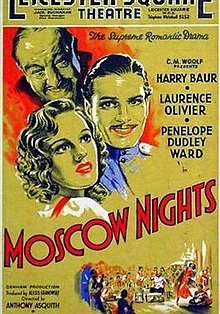Moscow Nights (1935 film)
| Moscow Nights | |
|---|---|
 | |
| Directed by | Anthony Asquith |
| Written by | Erich Seipmann Anthony Asquith |
| Based on | an unpublished novel by Pierre Benoît |
| Produced by | Alexis Granowsky |
| Starring | Laurence Olivier Penelope Dudley-Ward Harry Baur |
| Cinematography | Philip Tannura |
| Edited by | Francis D. Lyon |
| Music by | Muir Mathieson |
Production companies | Denham Films London Film Productions |
| Distributed by | General Film Distributors |
Release date |
|
Running time | 100 minutes |
| Country | United Kingdom |
| Language | English |
Moscow Nights (released as I Stand Condemned in the United States) is a 1935 British drama film directed by Anthony Asquith and starring Laurence Olivier, Penelope Dudley-Ward and Harry Baur. The screenplay concerns a wounded officer who falls in love with his nurse.
Based on a novel by Pierre Benoit, it is a remake of the 1934 French film of the same title. Harry Baur was the only actor to reprise his role from the original. It was shot at Denham and Isleworth Studios, both controlled by Alexander Korda's London Films.[1] The film's sets were designed by the art director Vincent Korda. It was released in the United States by United Artists.
Plot
[edit]During the First World War, a wounded Russian officer, Captain Ignatoff, falls in love with his nurse. Matters are complicated by the fact that she is already engaged to a wealthy merchant.
Cast
[edit]- Harry Baur as Brioukov
- Penelope Dudley-Ward as Natasha
- Laurence Olivier as Captain Ignatoff
- Athene Seyler as Madame Sabline
- Lilian Braithwaite as Countess
- Morton Selten as Kovrin
- Sam Livesey as Fedor
- Robert Cochran as Polonsky
- Hay Petrie as Spy
- Walter Hudd as The Doctor
- Kate Cutler as Madame Kovrin
- C. M. Hallard as President of Court Martial
- Charles Carson as Officer of Defence
- Edmund Willard as Officer of Prosecution
- Morland Graham as Bioukov's Servant
Critical response
[edit]Writing for The Spectator in 1935, Graham Greene called the film "completely bogus", and "the worst, as well as the most ballyhooed, film of the year". Asquith and Dudley-Ward were criticised in particular, with Greene describing Asquith's direction as puerile, and Dudley-Ward's acting as "country-house charades". Although Greene praised the acting from the rest of the film's stars, and noted that Asquith's past direction had been characterized by trickery, he commented that "now [Asquith's] bag of tricks seems empty".[2]
References
[edit]- ^ Wood p.87
- ^ Greene, Graham (15 November 1935). "Last Love/Moscow Nights/Oil for the Lamps of China". The Spectator. (reprinted in: Taylor, John Russell, ed. (1980). The Pleasure Dome. pp. 35–36. ISBN 0192812866.)
Bibliography
[edit]- Low, Rachael. Filmmaking in 1930s Britain. George Allen & Unwin, 1985.
- Wood, Linda. British Films, 1927-1939. British Film Institute, 1986.
External links
[edit]
- 1935 films
- 1935 drama films
- 1930s British films
- 1930s English-language films
- British black-and-white films
- British drama films
- British films about gambling
- British remakes of French films
- Films based on works by Pierre Benoit
- Films directed by Anthony Asquith
- Films set in 1916
- Films set in Russia
- Films shot at Isleworth Studios
- United Artists films
- World War I spy films
- 1930s British film stubs
